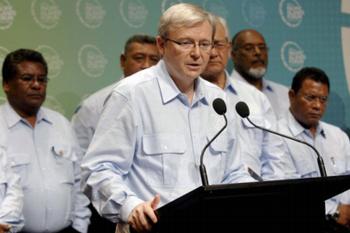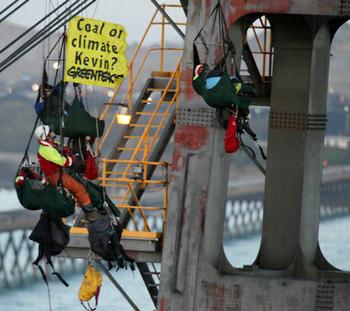At Risk of Rising Seas, Pacific Nations Demand Global Climate Action
CAIRNS, Australia, August 7, 2009 (ENS) - With rising sea levels encircling Pacific Island nations, heads of state and government across the Pacific Thursday adopted a climate change declaration advocating a strong global agreement to limit warming to two degrees Celsius or less.
At the Pacific Leaders Forum in Cairns, the officials said that with just 122 days to go before the United Nations climate conference in Copenhagen, "the international community is not on track to achieve the outcome we need unless we see a renewed mandate across all participating nations."
At Copenhagen, world leaders are expected to finalize a deal to limit greenhouse gas emissions that will take effect when the current Kyoto Protocol expires at the end of 2012.
The Pacific Leaders' declaration calls on states to ensure that global emissions peak no later than 2020 and to reduce global emissions by at least 50 percent below 1990 levels by 2050. These are the benchmarks adopted by the G8 industrial democracies in July.
The Pacific region is one of the most disaster-prone areas in the world, with natural hazards likely to worsen as the planet’s temperature rises.
Tuiloma Neroni Slade, the secretary general of the Pacific Islands Forum Secretariat, told the opening session on Wednesday, "While the changing and passing years have not left the Pacific untouched, what has not changed is the fundamental fragility of our region, the exposure of homelands and the vulnerability of communities."
 |
Australian Prime Minister Kevin Rudd addresses the Pacific Islands Forum. (Photo courtesy Office of the PM) |
Australian Prime Minister Kevin Rudd, who takes the rotating chair of the Forum this year, told his fellow government leaders, "The nations of the Pacific are particularly vulnerable to the impacts of climate change and Pacific island nations are among the least responsible for the causes of climate change. But they will bear the brunt of its impact the most. We must all act together to meet this challenge."
"We need concerted action – domestically, internationally, locally, globally – to meet the challenge of climate change," said Rudd. He assured the Pacific island leaders that Australia is representing the interests of their nations in other international fora such as the G20, a group of the world's largest national economies.
"We must use every opportunity to recommit ourselves as a region and as an international community to deliver a strong outcome in Copenhagen," said Rudd, "necessary for the planet, necessary for the Pacific, necessary for all our peoples."
Some villagers in the Pacific island nation of Kiribati [say Ki-ri-bas] already have been forced from their homes by rising sea levels, and officials warn that relocation could spark conflict due to traditional land rights.
Climate change "adds to the scale and complexity of human movement and displacement in the region," said Richard Towle, the regional representative for Australia, New Zealand, Papua New Guinea and the Pacific for the UN High Commissioner for Refugees.
"We need to act now if we are to find solutions for people whose homes, lands and livelihoods are, as we speak, being destroyed by rising sea levels and violent fluctuations in weather patterns in the region," said Towle.
 |
The runway at Tarawa, an atoll where the capital of the Pacific Island nation of Kiribati is located. (Photo by Michelle Glen) |
In an effort to quell potential climate change-driven conflicts before they erupt, the UNDP is helping to set up a new program in the Pacific region in partnership with other organizations in the area.
The "Interface between Climate Change, Disasters and Potential for Conflict in the Pacific" initiative seeks to boost the ability of national and regional groups to prevent and manage violent conflicts triggered by global warming.
In his message to the Forum, UN Secretary-General Ban Ki-moon announced that the United Nations is establishing a new system to mitigate the impact of the global economic crisis on poorer countries, such as those in the Pacific region that are already being hobbled by climate change.
The new Global Impact and Vulnerability Alert System will allow the world body "to better track the impact of the crisis – and thereby better respond," said Ban in the message, delivered by Supachai Panitchpakdi, secretary-general of the UN Conference on Trade and Development.
"The full repercussions have yet to be felt," said Ban, "but already we know we must do our utmost to prevent the unfavorable economic climate from undermining our efforts to fight climate change and achieve the Millennium Development Goals." Agreed by all world governments, the Millennium Development Goals seek to reduce poverty, hunger, environmental degradation and other social problems by 2015.
Ajay Chhibber, director of the Asia and the Pacific Regional Bureau of the UN Development Programme, told Forum delegates about the links between climate change and economic development. "We recognize climate change to be a critical development challenge with enormous implications for the entire range of development concerns - poverty, livelihoods, food security, conflict and social cohesion," he said.
Chhibber warned that during the current financial turmoil, global warming could potentially reverse "hard-won development gains in the region, which could compromise our collective ability to achieve the Millennium Development Goals and plans for a prosperous, peaceful and secure region."
The Australian Minister for Foreign Affairs Stephen Smith and the Minister for Climate Change and Water Penny Wong today announced funding priorities to assist Pacific Island countries to meet the immediate challenges of climate change.
Of A$150 million previously announced for the International Climate Change Adaptation Initiative, $50 million is being allocated today.
Half today's allocation will fund four programs, the ministers said - food security, water supply protection, and coastal zone management improvement, as well as disaster preparedness and disaster risk reduction.
A further $12 million will strengthen the capacity of Pacific Island countries to assess their vulnerabilities to climate change and develop adaptation strategies.
Australia will contribute $6 million to Pacific regional organizations for adaptation work on fisheries management and crop diversity; $4.3 million to upgrade sea level monitoring stations in Pacific countries, and $2.7 million to support nongovernmental organizations working on adaptation in the region.
 |
Hanging out at the Hay Point Coal Terminal, Greenpeacers protest the contribution to global warming made by burning Australian coal. (Photo courtesy Greenpeace) |
But some nonprofit groups are not impressed with Australia's efforts. Greenpeace called the Pacific Leaders declaration "uninspired" and the Rudd's position "fluff and spin."
On Thursday afternoon, Greenpeace steamed its largest vessel, the Esperanza, into Australia's Hay Point Coal Terminal in northeast Queensland, aiming to block a coal berth at one of the world's largest coal export ports. It was kept off the wharf by three police boats.
After spending nearly 36 hours hanging like fruitbats, four Greenpeace activists came down late Thursday from the massive coal loader at Hay Point where they were protesting coal expansion plans. Burning coal to produce electricity or run factories is a major source of greenhouse gas emissions.
Hay Point owners, the BHP Billiton Mitsubishi Alliance, have plans to expand the facility to accomodate an increase in coal exports. In July, BHP Billiton approved expansion plans for the Mount Arthur thermal coal project in New South Wales, which would increase production by 30 percent.
The Greenpeace action disrupted shiploading at Hay Point for two days. Greenpeace said the goal was to highlight "the massive expansion of Australian coal export capacity at a time when Pacific leaders are demanding real action on climate change."
Rising demand for coal, particularly in the Asian region, has resulted in a strong increase in the volume of coal exported through Australian ports.
"The Pacific Island leaders have made clear that they need emissions cuts of 45 percent," said Greenpeace Campaigner Lagi Toribau of Fiji. "All they have received so far are platitudes to help build higher sea walls against the rising tides caused by Australian coal."
Greenpeace Pacific Political Advisor Shirley Atatagi of Samoa blogged on the the Greenpeace website, "Getting our leaders to endorse two degrees as the limit in global temperature increases is a death sentence for small island countries like Tuvalu and Kiribati that the PIF [Pacific Island Forum] supposedly serves."
Copyright Environment News Service (ENS) 2009. All rights reserved.
To subscribe or visit go to: http://www.ens-newswire.com